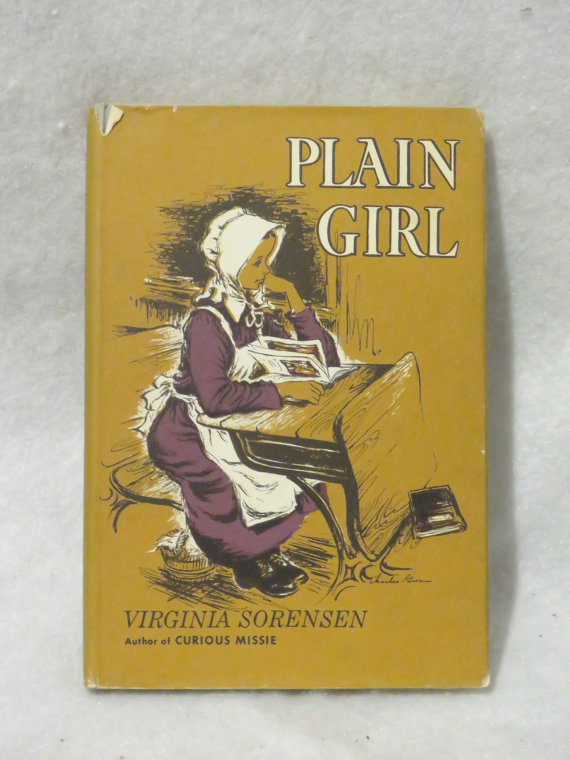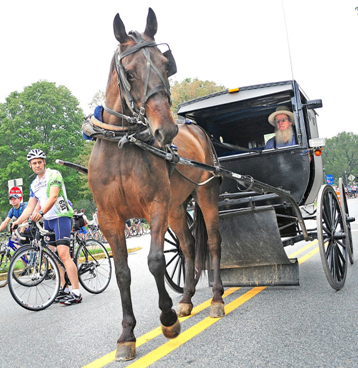The Amish are known for steadfast traditions and a tendency not to change. And this same generality can be extended to baby names and amish last names. Names within the Amish community skew towards traditional, historical, and family. There is no greater honor that an Amish family can bestow upon someone than to name a child after someone.

Jump to:
What's In a Name?
The question of what names Amish parents choose for their babies come up often. The Amish generally stick with family or Bible names and aren't so swayed by pop culture trends.
In non-Amish American culture, parents usually tend to just pick names that they like. In 2022, for instance, the most popular non-Amish boy name was Liam, with the most popular girls name being Olivia. Liam, of course, is a derivative of the traditional, long-standing William. Neither William nor Liam is a name I've ever heard among the Amish. I have run into Olivia, once or twice, but it is not common.
Among the Amish certain names are common in specific areas. Leander and Harley seem to be common Amish name that seems to be found in only certain areas, ditto for Swiss names like Verena. Mainstream American male names like Doug, Ted, Mike, Jeff, or Charlie or female names like Amy, Jennifer, and Diane are less common among the Amish. Of course there are going to be exceptions to each example I am using. This post is just a broad-brush overview.
Names among the Old Order Amish seem to be trending towards more unconventional over the past decade or so, but this mirrors a trend occurring in society as a whole. The trend towards the unconventional among the Amish is also accelerating because they are not as insulated of a culture as they used to be. The Amish are now bombarded with pop culture references from smartphones and societal influence as much as anyone.
I ran across one Amish family who recently named their son, Turner, and another with a newborn boy named Mason at the height of its popularity around 2010. An Amish family I know recently christened their daughter Sunny Rose. Kind of a cute name. So as Amish society changes, and the world around them also changes, names once heard of among the Amish will probably become the norm. Although Amish surnames seems to be steadfast.
The most common Amish names tend to have Biblical roots, and this - I have found - is especially true among the New Order Amish which often hews towards a move evangelical form of Amish culture.
Common Amish Boy Names
Aaron
Aaron is best known for his role in the exodus and for being the first of the Levitical, or Aaronic, priesthood. He was born to a family of Levites during Israel’s enslavement in Egypt and was Moses’ older brother, three years his senior (Exodus 7:7). We are first introduced to Aaron in Exodus 4 when God tells Moses that He will send Aaron, Moses’ brother, with him to free the Israelites from Pharaoh.
Abraham
This name may be viewed either as meaning "father of many" in Hebrew or else as a contraction of Abram 1 and hamon meaning "many, multitude". The biblical patriarch Abraham was originally named Abram but God changed his name. With his father Terah, he led his wife Sarah, his nephew Lot and their other followers from Ur into Canaan. He is regarded by Jews as being the founder of the Hebrews through his son Isaac and by Muslims as being the founder of the Arabs through his son Ishmael. As an English Christian name, Abraham became common after the Protestant Reformation.
Albert
The meaning of the name Albert is: Noble, bright. From the Old German name Adalbert. Although not mentioned directly in the bible it is a name of a Saint -- Saint Albert.
Amos
Amos, the first Hebrew prophet to have a biblical book named for him. He accurately foretold the destruction of the northern kingdom of Israel and, as a prophet of doom, anticipated later Old Testament prophets.
Ben/Benjamin
The Hebrew word Ben (בן), meaning "son" or "boy", forms part of many surnames in Hebrew and and yāmīn means (right side or right hand).. Benjamin comes from the Old Testament of the Bible, meaning “son of the right hand.” The Benjamin of the Bible was the youngest of Jacob’s twelve sons; the expression “the Benjamin of the family” means the youngest child.
Daniel
Daniel was a celebrated Jewish scholar and master interpreter of dreams who was exiled to Babylon after the destruction of the Holy Temple in Jerusalem. He is famous for successfully interpreting the proverbial “writing on the wall” and miraculously surviving the lions’ den. His book is included in the canon of sacred Jewish writings.
David
David is the second king of ancient Israel. He founded the Judaean dynasty and united all the tribes of Israel under a single monarch. His son Solomon expanded the empire that David built. David is an important figure in Judaism, Christianity, and Islam.
Eli
Eli was a devoted high priest who served 40 years as judge of Israel, the first of priestly descent also to regulate the affairs of the people. Eli was a good man who gave kind consideration to Hannah in her hour of great agony and paid careful attention to the upbringing and spiritual training of Hannah’s son Samuel. Eli himself had two sons, Hophni and Phinehas. Together the three of them labored as priests at Shiloh in the tabernacle, where the ark of the covenant was housed.
Elmo
Erasmus of Formia, also known as Saint Elmo (died c. 303), was a Christian saint and martyr. He is venerated as the patron saint of sailors and abdominal pain. Erasmus or Elmo is also one of the Fourteen Holy Helpers, saintly figures of Christian tradition who are venerated especially as intercessors.
Jacob
The meaning of Jacob comes from the Old Testament and means “supplanter,” which is often interpreted as someone who seizes, circumvents, or usurps. In the book of Genesis, the twins Jacob and Esau were born to Isaac and Rebecca; Esau came first, making him the first-born son. When Jacob was born he was holding onto Esau’s heel. This foreshadows two future Biblical events where Jacob usurps or seizes Esau’s birthright as the first-born son.
Jeremiah
From the Hebrew name יִרְמְיָהוּ (Yirmiyahu) meaning "Yahweh will exalt", from the roots רוּם (rum) meaning "to exalt" and יָה (yah) referring to the Hebrew God. This is the name of one of the major prophets of the Old Testament, the author of the Book of Jeremiah and the Book of Lamentations (supposedly). He lived to see the Babylonian destruction of Jerusalem in the 6th century BC.
Joseph
Joseph is a masculine name of Hebrew origin boasting great prominence across the Christian bible. Rooted in the Hebrew name Yosef, meaning "Jehovah shall add," Joseph represents several beloved and just figures. Most significantly is Jacob's favored son, whom he lovingly gifts the famous colorful coat. Though forced into slavery by virtue of his brothers' rampant jealousy, young Joseph emerges triumphant as a respected leader greatly favored by the Pharaoh. Far from resentful, he revives Egypt from the famine before reconciling with his estranged family. Throughout the Old and New Testament, Joseph remains a worthwhile title demonstrating the merits that lie in fostering a forgiving, kind, and open heart.
Levi
Possibly means "joined, attached" in Hebrew. As told in the Old Testament, Levi was the third son of Jacob and Leah, and the ancestor of one of the twelve tribes of the Israelites, known as the Levites. This was the tribe that formed the priestly class of the Israelites. The brothers Moses and Aaron were members. This name also occurs in the New Testament, where it is another name for the apostle Matthew.
Mark
Mark is a traditionally masculine name with roots in the Bible as well as Latin and Swedish. It can mean "polite," "shining," "warring," or "hammer." In Latin, the name Mark comes from Marcus which in turn comes from Mars, the Roman god of war. In the Bible, St. Mark was the author of the second Gospel.
Marvin
Marvin is baby boy name mainly popular in Christian religion and its main origin is Welsh. Marvin name meanings is Lover of the sea.
Paul
St. Paul the Apostle, original name Saul of Tarsus, is one of the leaders of the first generation of Christians, often considered to be the most important person after Jesus in the history of Christianity. Paul was compelled to struggle, therefore, to establish his own worth and authority. His surviving letters, however, have had enormous influence on subsequent Christianity and secure his place as one of the greatest religious leaders of all time.
Samuel
Samuel was a man chosen for God, from his miraculous birth until his death. He served in several important positions during his life, earning God's favor because he knew how to obey.
Samuel was a contemporary of King Saul and King David. His parents Elkanah and Hannah dedicated him to the Lord, giving the child to the priest Eli to be raised in the temple. In Acts 3:20 Samuel is portrayed as the last of the judges and the first of the prophets. Few people in the Bible were as obedient to God as Samuel.
Roy
The name Roy means “red” and “redhead” (from Celtic”ruadh”) and “shepherd” or “my shepherd” (from Hebrew “ro’e/רוֹעֶה”). Besides, people like to derive the name from French “roi” meaning “king”.

But there are a whole slew of "second tier" names which are also very popular among the Amish. Particularly names that emphasize masculinity. Here are some of the more popular ones.
Freeman
This name is very literal meaning a free man, one freed from bound servitude to an overlord. It is of Old English origin.
Lloyd
Lloyd is a masculine name of Welsh origin. Derived from the Welsh word llwyd, it means "gray-haired" or "sacred." While not typically associated with youth, gray hair is often interpreted as a symbol of wisdom and mature intellect. Lloyd is also a popular surname throughout parts of Wales.
Roman
The name Roman has various origins, but the most commonly referred to one is the Hebrew origin which means "strong, powerful." Roman is also used to refer to people who descended from Rome. It derives from the Latin name Romanus.
Truman
The name Truman is boy's name of English origin meaning "loyal one". The derivation is the Middle English trewe meaning faithful or steadfast. It probably emerged first as a given name and then as a surname.
Common Amish Girl Names
Barbara
The name Barbara has an interesting relationship to Christianity. St. Barbara, legendary virgin martyr of the early church. Venerated as one of the 14 Auxiliary Saints (Holy Helpers), she is invoked in thunderstorms and is the patron saint of artillerymen and miners. Because Barbara’s authenticity is highly questionable and her legend is probably spurious, she was dropped from the General Roman Calendar in 1969.
According to legend, which dates only to the 7th century, she was the beautiful daughter of a pagan, Dioscorus, who kept her guarded in a tower to protect her from harm. When she professed Christianity and refused marriage, he became enraged and took her to the provincial prefect, who ordered her to be tortured and beheaded. Dioscorus himself performed the execution and, upon his return home, was struck by lightning and reduced to ashes.
Elizabeth
Elizabeth in the Bible was the wife of a priest named Zechariah; she was also a cousin of Mary, the mother of Jesus. Elizabeth and Zechariah are called “righteous and blameless” people who walked in all the commandments of the Lord (Luke 1:6). Elizabeth was barren; she was unable to have children (Luke 1:7). When Elizabeth is first mentioned in the Bible, she is an old woman, or as Luke puts it, “advanced in years”. In a much more complicated tale "barren" Elizabeth ends up the mother to John the Baptist, who ministered “before the Lord, in the spirit and power of Elijah” (Luke 1:17) and was the prophet who prepared the way of the Lord, fulfilling Malachi’s prophecy.
Emma
The name Emma means “whole” or “universal” in German. When translated to Hebrew, it means “all containing.” Saint Emma references Emma of Gurk (sometimes spelled Hemma ou Gemma) – who is a holy widow, founder of several monasteries in Austria.
Esther
Possibly means "star" in Persian. Alternatively it could be a derivative of the name of the Near Eastern goddess Ishtar. The Book of Esther in the Old Testament tells the story of Queen Esther, the Jewish wife of the king of Persia. The king's advisor Haman persuaded the king to exterminate all the Jews in the realm. Warned of this plot by her cousin Mordecai, Esther revealed her Jewish ancestry and convinced the king to execute Haman instead. Her original Hebrew name was Hadassah.
Judith/Judy
In the Roman Catholic and Orthodox Christian religion, Judith was a beautiful woman who decapitated an invading general. The story is thought to be a warning about beautiful and daring women. A short form of Judith, from the Hebrew name Yehudit meaning "woman from Judea". Also a feminine form of Judah.
Gloria
Gloria is a feminine name of Latin origin meaning “glory.” This revered moniker is derived from the Latin word gloriae, which translates to “immortal glory.”
Mary
The name Mary is of various origins, but most notably Hebrew origin and means "bitter, beloved, or drop of the sea." It is derived from the Hebrew name Maryam/Mariam, and though the origins are not entirely clear, it is believed the meaning of Maryam is "drop of the sea" (from Hebrew roots mar, meaning "drop" and yam, meaning "sea"); "bitter" (from Hebrew marah, meaning "bitterness"); and "beloved" (from the Egyptian root mr).
Miriam
Miriam was the name of Moses’ sister in the Old Testament of the Bible. This name may have come from a root meaning “beloved,” or from a word meaning “bitter” or “rebellious,” a reference to the biblical Miriam’s life as a slave in Egypt.
Nancy
Nancy is a traditionally feminine name meaning "favor," or "grace." It has Hebrew and French roots and was introduced to England in the 1200s as a nickname for Anne or Ancy (the latter itself being a nickname for Annis, a Medieval English version of Agnes). Some say the name Nancy actually began as a contraction of "mine Ancy."
Rachel
Rachel, in Genesis, the first book of the Hebrew Bible, one of the two wives of the patriarch Jacob. Forced to serve Rachel’s father, Laban, for seven years to win her, Jacob was tricked at the end of that time into marrying her sister, Leah. He was then allowed to marry Rachel as well, in return for seven more years of labour. At first childless, Rachel eventually gave birth to Joseph and died giving birth to Benjamin.
Rebecca
From the Hebrew name רִבְקָה (Rivqah), probably from a Semitic root meaning "join, tie, snare". This is the name of the wife of Isaac and the mother of Esau and Jacob in the Old Testament. This name was popular with the Puritans in the 17th century. It has been consistently used since then, becoming especially common in the second half of the 20th century.
Ruth
From a Hebrew name that was derived from the Hebrew word רְעוּת (re'ut) meaning "friend". This is the name of the central character in the Book of Ruth in the Old Testament. She was a Moabite woman who accompanied her mother-in-law Naomi back to Bethlehem after Ruth's husband died. There she met and married Boaz. She was an ancestor of King David. As a Christian name, Ruth has been in use since the Protestant Reformation. In England it was associated with the archaic word ruth meaning "pity, compassion" (now only commonly seen in the word ruthless).
Sarah
Means "lady, princess, noblewoman" in Hebrew. In the Old Testament this is the name of Abraham's wife, considered the matriarch of the Jewish people. She was barren until she unexpectedly became pregnant with Isaac at the age of 90. Her name was originally Sarai, but God changed it at the same time Abraham's name was changed (see Genesis 17:15). In England, Sarah came into use after the Protestant Reformation. It was consistently popular in the 20th century throughout the English-speaking world, reaching the top of the charts for England and Wales in the 1970s and 80s.
Susannah/Susan
Susanna is the Biblical Latin form of the Greek Sousanna, itself a transliteration of the Hebrew Shoshana meaning, quite simply, “lily.” Many scholars believe the name ultimately finds its roots in the Egyptian element “sšn” meaning, apropos, “lotus” (water lily), a flower of great importance to the early people of the Mediterranean. To the Ancient Egyptians, it was symbolic of the sun, creation and rebirth – at night the lotus flower closes and sinks underwater, only to rise and blossom again at dawn.
Susanna (Hebrew: Shoshana) is a notable character from the Hebrew Bible's Book of Daniel, a narrative also recognized by Christians. Her story goes something like this: Susanna was a very beautiful, God-fearing and faithful Jewish woman living in Babylon during a period of exile.

But, like with men, there is a whole slew of "second tier" names that are heavily embraced by the Amish.
Amanda
The name Amanda is girl's name of Latin origin meaning "she must be loved".
Ada
The name Ada is girl's name of German origin meaning "noble, nobility".
Ada is derived from the German name Adelaide, which came from the ancient name Adalheidis. The root, adal, is a Germanic word meaning "noble." Ada can also be considered a variation of the biblical name Adah, pronounced AH-da, one of the first girls’ names mentioned in the Book of Genesis.
Linda
The name Linda is girl's name of Spanish, Italian, Portuguese origin meaning "pretty
Frieda
Freida is Hebrew Girl name and meaning of this name is "Peace; Wise Judge; Peaceful Ruler".
Hannah
The name Hannah stems from the Hebrew name Channah, which means "favor" or "grace." It is a biblical name, with Hannah appearing in the Old Testament as the mother of Samuel.
An Snapshot of Amish Names in An Ohio Community
Let's look at some names of births in Geauga County, Ohio's Amish settlement over the past year. This is a very conventional, middle-of-the-road community, so I think they are pretty representative.
Ohio Amish Boy Names: Isaac. Jason , Kenny, Aden, Caleb & Ray
Ohio Amish Girl Names: Susie, Lorraine, Martha, Mae, Ellen & Lorena
Some of the names caught me off guard. And Kenny seems a little out of place, but for the most part these are very conventional names. Probably family names.
The pages of the Amish newspaper, The Budget, are a super place to "take the temperature" of Amish baby names. Here are some recent first names that have appeared in the Budget: Devon, John, Leland, James, Dean, Mary Ellen, Billy, Noah, Sam, Steve, Aden, and Henry. I like using The Budget to look at Amish names because it provides a real-life window.
Amish columnists in newspapers also can give a good glimpse into the world of Amish names: Dustin, Denzel, Crystal, Ervin, and Millie. Those columns provide another real-life window. So the take away is that while the Amish are still heavily leaning on traditional names, newer ones are seeping into their culture.
Amish Names FAQ
Yes! Naming a baby after a parent or a favorite Aunt or Uncle is common in Amish culture and is considered a great honor. What better honor and legacy to bestow upon someone than to have their own namesake. That is why you may have several "Marvin Millers" or "Roy Bontragers" in the same extended family!
Can you think of any very common Amish first names that I should have added to the above lists?









Rebecca
A few common names in the community we live in the midst of are Henry, Harvey, Mose and Elma.So it gets REALLY confusing sometimes. With a Christena and then Jesse for a boy that is out of the ordinary here at home. What I find interesting is my husbands family uses only the fathers intial as the middle name. Hum... wonder if this common in other communities?
Kevin
Hi, Rebecca - Thanks for stopping by. I have run into "middle initial only" in many Amish settlements. For instance, that is common around Berne...a name might be Henry A. Schwartz, with the A standing for the father's first name.
Becky
That's so interesting! I was thinking it was something that his family did. Thanks for the response!
Verity
I'm wondering if Katura would be the Biblical Keturah (meaning = incense)?
Kevin
Yes, Verity, that is the case! Beautiful name!